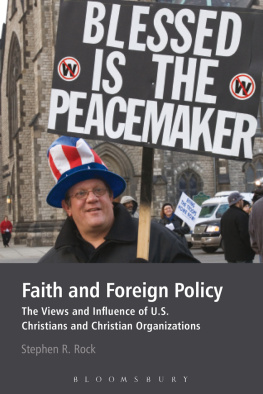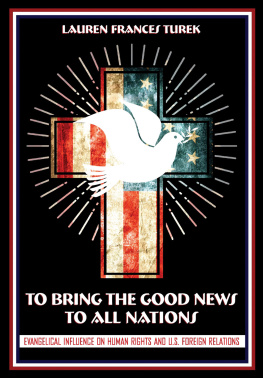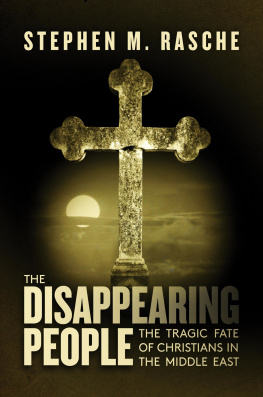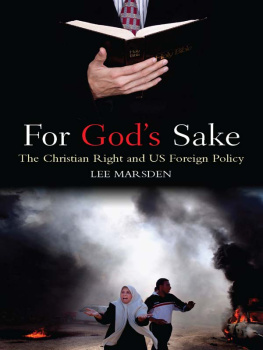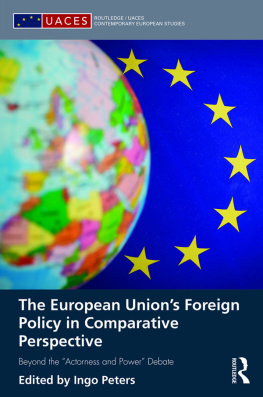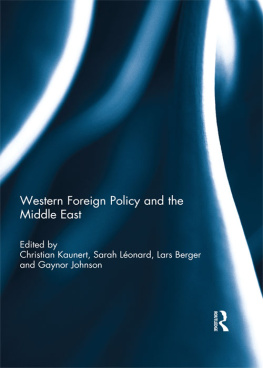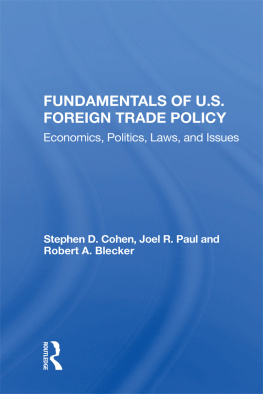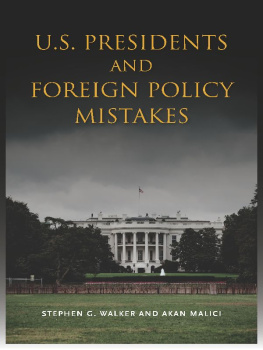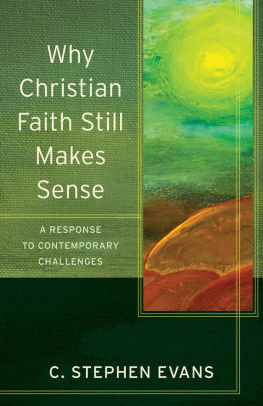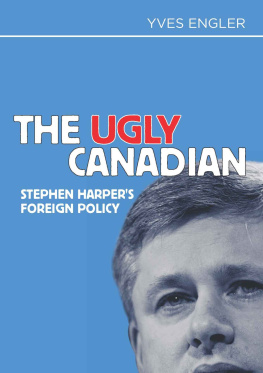Faith and Foreign Policy
FAITH AND FOREIGN
POLICY
The Views and Influence of U.S. Christians and Christian Organizations
by
Stephen R. Rock
For Andy and Julia
Contents
List of Illustrations
Tables
Table 1.1: Major Protestant Organizations in the United States
Table 3.1: Views of U.S. Christians Regarding the Use of Force
Table 4.1: Views of U.S. Christians Regarding Human Rights Policy
Table 5.1: Views of U.S. Christians Regarding Middle East Policy
Table 6.1: Views of U.S. Christians Regarding International Law and Institutions/United Nations
Table 7.1: Views of U.S. Christians Regarding Protection of the International Environment
Table 8.1: Summary of Foreign Policy Differences among U.S. Christians
Table 8.2: Explaining Foreign Policy Differences among U.S. Christians
Figure
Figure 2.1: How Religion Influences U.S. Foreign Policy
Preface
This book lies at the intersection of important personal and intellectual interests. I am a life-long Christian, raised in the Lutheran Church of America and for many years now a United Methodist. Since my days in catechism classes, I have been intrigued by differences in the histories, cultures, and doctrines of various Christian denominations, as well as those of other religions. I am also a professional student of U.S. foreign policy, having taught courses in that area my entire career. While my earlier published work falls more properly within the field of international politics, a good portion of it relies on case studies drawn from the history of U.S. foreign relations.
This project was inspired by intense disagreement among members of the U.S. Christian community over the U.S. invasion of Iraq in March 2003. Within the congregation to which I belong, there existed deep differences of opinion regarding the moral permissibility and wisdom of attacking Iraq and overthrowing the regime of Saddam Hussein. The United Methodist Church, like most Mainline Protestant denominations and the Roman Catholic Church, was outspokenly opposed to the war, but Evangelical Protestant leaders and Evangelical Protestant denominations such as the Southern Baptist Convention generally supported it. What, I wondered, accounted for the sharp divergence of views? What other differences on foreign policy issues existed and what explained them? Did the religious beliefs and policy preferences of Christian groups within the United States influence the conduct and substance of U.S. foreign policy? If so, how and when? This book represents my attempt to answer these and other questions.
As a life-long member of Mainline Protestant churches, my religious convictions and my foreign policy preferences are, not surprisingly, more typical of Mainline Protestants as a group than they are of either Evangelical Protestants or Roman Catholics. I have tried hard to be self-conscious regarding my prejudices and fair to those with whom I might disagree on matters both theological and political. I hope that I have succeeded.
No one can complete a project of this magnitude without the help and support of others. For reading the manuscript and offering many helpful suggestions, I am grateful to my father, William R. Rock, professional historian and amateur theologian; the Reverend Robert Thompson-Gee, pastor of Poughkeepsie United Methodist Church; Peter S. Henne, my former research assistant and now a Ph.D. student at Georgetown University; and Professor James L. Guth of Furman University, who generously shared with me some of his own research. A series of student assistants aided me in various ways. In addition to Peter Henne, I owe particular thanks to Michael Frenkel and Nikola Trkulja. Sabbaticals provided by my employer, Vassar College, allowed me to finish the study more rapidly than would otherwise have been possible. My editor at Continuum, Marie-Claire Antoine, read draft chapters promptly, made many constructive comments, and was a consistent source of encouragement. Molly Morrison and her colleague Vidya Priya copyedited the manuscript with a light hand and a keen eye. P. Muralidharan, of Newgen Publishing and Data Services, who handled the typesetting, was patient in answering my questions and meticulous in making corrections from the proofs.
Being able to share the publication of this book with my family is a tremendous pleasure. To my parents, who provided the foundation for everything I have accomplished personally and professionally: Thank you, from the bottom of my heart. To my wife, Jenny Arden, who read the manuscript and with whom I celebrated 27 years of marriage in 2010: You have my profound gratitude and my undying love. To our children, Andy and Julia, who, during the course of this project were somehow transformed from children into young adults: I hope that someday you will truly understand the joy and pride that your mother and I have felt, and continue to feel, at watching you grow and seeing what you become. This book is for you.
CHAPTER 1
Faith and Foreign Policy: An Introduction
I base a lot of my foreign policy decisions on some things that I think are true. One, I believe theres an Almighty. And, secondly, I believe one of the great gifts of the Almighty is the desire in everybodys soul, regardless of what you look like or where you live, to be free.
George W. Bush
Religion shapes the nations character, helps form Americans ideas about the world, and influences the ways Americans respond to events beyond their borders. Religion explains both Americans sense of themselves as a chosen people and their belief that they have a duty to spread their values throughout the world. Of course, not all Americans believe such thingsand those who do often bitterly disagree over exactly what they mean. But enough believe them that the ideas exercise profound influence over the countrys behavior abroad.
Walter Russell Mead
U.S. Christians and the War in Iraq
On March 20, 2003, military forces of the United States and other members of a multinational coalition invaded Iraq. The outbreak of war came as no surprise. For months, the U.S. government had sought to obtain a United Nations Security Council Resolution authorizing the use of force against the government of Saddam Hussein. When that effort failed, the Bush administration had declared its intention to proceed without U.N. authorization.
Christian leaders and institutions in the United States reacted in divergent ways to the threat of war in Iraq, and to the war itself. Mainline Protestant denominations vigorously and almost unanimously opposed the opening of hostilities.
Organs of the Roman Catholic Church in the United States also articulated serious reservations about the use of force in Iraq. In November 2002, the United States Conference of Catholic Bishops wrote, We harbor no illusions about the behavior or intentions of the Iraqi government and noted that they did not offer definitive conclusions regarding the moral status of the approaching conflict. Nevertheless, the bishops stated, We fear that resort to war, under present circumstances and in light of current public information, would not meet the strict conditions in Catholic teaching for overriding the strong presumption against the use of military force and they urged that our nation and the world continue to pursue actively alternatives to war in the Middle East.




